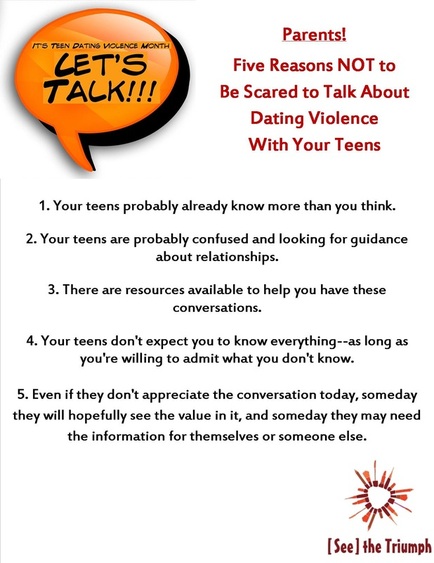|
By Christine Murray, See the Triumph Co-Founder
For many parents, the thought of talking with teenagers about difficult topics, such as dating violence, is uncomfortable, if not downright scary. All this month, we’re focusing on starting conversations about teen dating violence, and we know these conversations are not the easiest conversations to have. There are lots of reasons why these conversations can be scary. For example, parents may fear they won’t know what to say, especially if their teenagers ask questions that they don’t know how to answer. Also, I think one of the big challenges that parents face when having conversations about these difficult topics is trying to balance their natural concern for their teenagers’ safety with their desire to foster their independence. It can be tempting to try to tell your teenagers exactly what to do and what not to do. But we all know that teenagers can be rebellious, so too much of a lecture-type conversation can backfire. There are so many factors that can make these conversations uncomfortable that it may be tempting to avoid them altogether. However, we want to encourage you to step into that discomfort, and start those conversations anyway! In a few days, we’ll share some suggestions for how to start conversations in non-threatening ways. But to help you start to get in the right mindset, I thought we’d set the stage with the following five reasons NOT to be scared to talk about dating violence with your teens: 1. Your teens probably already know more than you think. As I discussed in a previous blog, “Loveisrespect.org reports that over 80% of parents either do not think that teen dating violence is an issue for teens, or they do not know if it is.” This is despite the high rates of dating violence that are consistently found in surveys of teenagers. It seems that many parents are a bit out of touch with the challenges that teenagers face as they begin entering dating relationships. 2. Your teens are probably confused and looking for guidance about relationships. Do you remember how you felt about dating and relationships when you were in your teen years? You may have acted like you had it all figured out, but chances are you were scared and anxious about some, if not all, aspects of dating and being in a relationship. Of course, many teenagers may not initially be thrilled by the thought of talking about dating with their parents. But, if you approach the conversation in a comfortable, open way, it’s likely they’ll appreciate hearing your thoughts on relationships, especially if you are honest about some of the challenges you’ve faced in your own life. 3. There are resources available to help you have these conversations. Later this month, we’ll share a list of our favorite web-sites for credible information on teen dating violence. In addition to these sites, there are likely professionals and organizations in your area who could help you have these conversations if you find yourself out of your comfort zone or beyond the scope of your knowledge. You don’t have to go it alone. 4. Your teens don't expect you to know everything--as long as you're willing to admit what you don't know. As kids enter their teen years, they become increasingly aware of their parents’ limitations, so your teenagers probably already don’t think you have all the answers. I believe that admitting that you don’t know everything, but that you’re willing to learn alongside your teen, is a great way to start a dialogue. When you come across topics you don’t understand, you can research them together and discuss what you’ve learned. 5. Even if they don't appreciate the conversation today, someday they will hopefully see the value in it, and someday they may need the information for themselves or someone else. Rates of intimate partner violence are highest for girls between the ages of 16 and 24 (Loveisrespect.org). During their teen and young adult years, then, people face perhaps their highest risk of being abused by an intimate partner than they will face at any point in their lives. Of course, as parents, we don’t want to think that bad things will happen to our own children. Hopefully they won’t. But we can equip them with information and resources that they may one day be able to put into practice in their own lives, or that would help them to be a better helper to a friend in need. I know that talking about sensitive topics with kids is difficult and scary at times. Based on our research that underlies See the Triumph, I believe that the stigma surrounding abuse makes these conversations even more difficult. However, parents can reduce their fears by considering how much these conversations can mean to their teenagers. Comments are closed.
|
Archives
July 2024
CategoriesAll About Intimate Partner Violence About Intimate Partner Violence Advocacy Ambassadors Children Churches College Campuses Cultural Issues Domestic Violence Awareness Month Financial Recovery How To Help A Friend Human Rights Human-rights Immigrants International Media Overcoming Past Abuse Overcoming-past-abuse Parenting Prevention Resources For Survivors Safe Relationships Following Abuse Schools Selfcare Self-care Sexual Assault Sexuality Social Justice Social-justice Stigma Supporting Survivors Survivor Quotes Survivor-quotes Survivor Stories Teen Dating Violence Trafficking Transformative-approaches |
Search by typing & pressing enter



 RSS Feed
RSS Feed